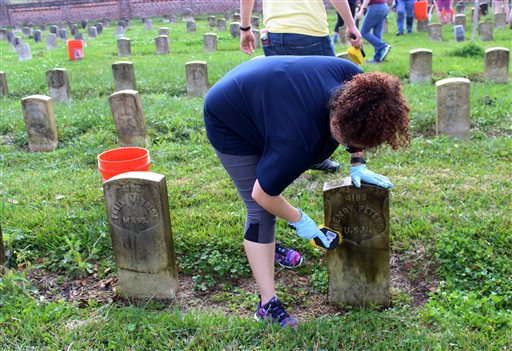CHALMETTE, La. (AP) — College students on spring break joined hundreds of other volunteers at a cemetery dating to the Civil War, realigning hundreds of tilted headstones and scrubbing grime from thousands more. Some mark the graves of Union soldiers, others are from later eras.
College students from Ohio and Boy Scouts from Texas were among more than 800 people who pitched in to restore graves at Chalmette National Cemetery near New Orleans. Many of the roughly 8,000 headstones were green with algae, stained with soot from nearby refineries or askew in spongy Mississippi River soil. Flooding from Hurricane Katrina in 2005 also took its toll.
“We’re sitting on a delta,” said Ranger Kristy Wallisch, spokeswoman for Jean Lafitte National Historical Park and Preserve, which includes the cemetery. “Just like our houses and other things, these headstones start to sink under their own weight, and tilt.”
More than a century and half since the end of the deadliest conflict on American soil, custodians of many such cemeteries are still doing battle in their upkeep.
The cemetery was created in 1864, when Union troops occupied New Orleans. Most of the Civil War-era soldiers died of such diseases as yellow fever, dysentery and pneumonia, said park curator Kathy Lang.
“Some enlisted, say, in December and died in May from disease. That’s kind of sad,” she said. But New Orleans isn’t unique: about two-thirds of the roughly 620,000 Civil War casualties died of disease, not wounds.
The National Park Service maintains 14 national cemeteries, the Department of Veterans Affairs 134 and the Army two, including Arlington National Cemetery outside Washington, D.C.
Nationwide budget cuts have not spared this cemetery. Wallisch said the Chalmette cemetery site — including an adjacent tract where the Battle of New Orleans was fought in 1815 — has just three or four maintenance workers compared to six or seven years ago.
That’s where the army of volunteers came in, including about 50 Ohio State University students seeking a different kind of spring break. The National Trust for Historical Preservation called volunteers ages 16 to 70 to take part in its 3-year-old “HOPE Crew,” or the Hands-On Preservation Experience.
The Chalmette project began in early March and concludes Friday.
“We get people to work with their hands, have a very real and visceral experience and closer connection to restoration,” said project coordinator Monica Rhodes.
A volunteer crew of professionals pulled headstones from the most misaligned sections of the cemetery early on. The non-pro volunteers took it from there, taking up buckets and sponges under the guidance of restoration experts.
When the OSU students were there, Rusty Brenner of Texas Cemetery Restoration LLC in Dallas explained how to calculate the depth of the holes they needed and how much gravel to add before setting the head stones precisely upright.
“The gravel keeps it steady,” said Monet Scroggins, one student from Dayton, Ohio.
“Right. And it allows drainage,” Brenner said.
Jason Church of the park service’s National Center for Preservation Technology and Training said Chalmette’s is in a more industrial area than most national cemeteries. It’s bounded by an oil refinery and a sugar refinery beside the Mississippi River.
He said more than 260 headstones have been realigned, though recent storms soaked the soil so much that few could be re-seated this week. “We’re hitting water at 4 inches deep,” Church said recently.
Volunteers made up for that by cleaning 600 to 800 headstones a day, he said, so that more than 5,000 headstones and well over 1,000 smaller markers had been cleaned days before Friday’s project close.
About 6,000 unknown soldiers have only small marble markers, said Courtney “Cam” Amabile, the park’s resources program assistant.
The 6-inch tall markers aren’t much higher than the fire ant mounds and mudball “castles” of crawfish burrows dotting the grounds.
In total, Amabile tallied up 14,121 headstones and markers at the cemetery. Wallisch said about 7,300 Union soldiers and sailors are buried at the site. All died somewhere in Louisiana during the war. The remaining graves hold military personnel who served in eras through the Vietnam War.
Nearly 130 Confederate soldiers were also buried in a mass grave at Chalmette but were moved after the war when Congress passed a law stating only Union soldiers could be buried in the national cemeteries, Wallisch said. Nearly 7,000 African-American civilian graves were also relocated, she said.
Boy Scouts from Corpus, Christi, Texas, also worked at the cemetery, said HOPE Crew’s Rhodes. So have community groups, military groups, high school students and alumni from several universities.
“Everybody’s giving a little bit to achieve a major goal,” Rhodes said.
Copyright 2016 The Associated Press. All rights reserved. This material may not be published, broadcast, rewritten or redistributed.









.jpg)